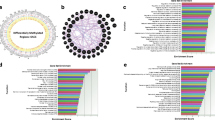Abstract
Death-associated protein kinase (DAPK) has been suggested as a tumor suppressor gene. A high frequency of DAPK promoter hypermethylation has been noted in head and neck cancers and other solid tumors, and it has been used as a tumor marker in molecular detection strategies. Our aim was to examine DAPK promoter hypermethylation in tissue, blood, and salivary rinse samples of oral precancer patients (OPs) and to explore the potential role in oral carcinogenesis. DAPK hypermethylation was analyzed in 77 OPs and 32 oral squamous cell carcinomas (OSCCs) by real-time quantitative methylation-specific PCR (QMSP). We compared the hypermethylation expression between two groups and analyzed the associations with clinicopathologic parameters. The promoter hypermethylation frequency of DAPK in tissue (46.9%) and blood (52.2%) of OSCCs was significantly higher than those in OPs (19.5%, P = 0.004; 22.4%, P = 0.007, respectively). DAPK promoter hypermethylation expression in blood was correlated with its expression in tissue (r = 0.49, P < 0.000). The OP patients who smoked more than 20 years were found 40.0% tissue DAPK hypermethylation in contrast with 10.7% tissue DAPK hypermethylation in the patients whose smoking duration ≦20 years (P = 0.010). Our results suggest that DAPK hypermethylation is an early event in oral carcinogenesis and blood DAPK hypermethylation might be a potential minimal invasive biomarker for OSCC early detection.


Similar content being viewed by others
References
Jemal A, Siegel R, Xu J, Ward E. Cancer statistics, 2010. CA Cancer J Clin. 2010;60(5):277–300.
Silverman S, Bhargava K, Smith LW, Malaowalla AM. Malignant transformation and natural history of oral leukoplakia in 57, 518 industrial workers of Gujarat, India. Cancer. 1976;38(4):1790–5.
Schepman KP, van der Meij EH, Smeele LE, van der Waal I. Malignant transformation of oral leukoplakia: a follow-up study of a hospital-based population of 166 patients with oral leukoplakia from The Netherlands. Oral Oncol. 1998;34(4):270–5.
Lee JJ, et al. Predicting cancer development in oral leukoplakia: ten years of translational research. Clin Cancer Res. 2000;6(5):1702–10.
Baylin SB, et al. Alterations in DNA methylation: a fundamental aspect of neoplasia. Adv Cancer Res. 1998;72:141–96.
Ha PK, Califano JA. Promoter methylation and inactivation of tumour-suppressor genes in oral squamous-cell carcinoma. Lancet Oncol. 2006;7(1):77–82.
Velentza AV, et al. A protein kinase associated with apoptosis and tumor suppression: structure, activity, and discovery of peptide substrates. J Biol Chem. 2001;276(42):38956–65.
Tada Y, et al. The association of death-associated protein kinase hypermethylation with early recurrence in superficial bladder cancers. Cancer Res. 2002;62(14):4048–53.
Martone T, et al. Association between hypermethylated tumor and paired surgical margins in head and neck squamous cell carcinomas. Clin Cancer Res. 2007;13(17):5089–94.
Thompson L. World health organization classification of tumours: pathology and genetics of head and neck tumours. Ear Nose Throat J. 2006;85(2):74.
Carvalho AL, et al. Deleted in colorectal cancer is a putative conditional tumor-suppressor gene inactivated by promoter hypermethylation in head and neck squamous cell carcinoma. Cancer Res. 2006;66(19):9401–7.
Rosas SL, et al. Promoter hypermethylation patterns of p16, O6-methylguanine-DNA-methyltransferase, and death-associated protein kinase in tumors and saliva of head and neck cancer patients. Cancer Res. 2001;61(3):939–42.
Jeronimo C, et al. Quantitation of GSTP1 methylation in non-neoplastic prostatic tissue and organ-confined prostate adenocarcinoma. J Natl Cancer Inst. 2001;93(22):1747–52.
Harden SV, et al. Gene promoter hypermethylation in tumors and lymph nodes of stage I lung cancer patients. Clin Cancer Res. 2003;9(4):1370–5.
Lumerman H, Freedman P, Kerpel S. Oral epithelial dysplasia and the development of invasive squamous cell carcinoma. Oral Surg Oral Med Oral Pathol Oral Radiol Endod. 1995;79(3):321–9.
Hoque MO, et al. Changes in CpG islands promoter methylation patterns during ductal breast carcinoma progression. Cancer Epidemiol Biomarkers Prev. 2009;18(10):2694–700.
Deng G, et al. Unique methylation pattern of oncostatin m receptor gene in cancers of colorectum and other digestive organs. Clin Cancer Res. 2009;15(5):1519–26.
Maruya S, et al. Differential methylation status of tumor-associated genes in head and neck squamous carcinoma: incidence and potential implications. Clin Cancer Res. 2004;10(11):3825–30.
Kulkarni V, Saranath D. Concurrent hypermethylation of multiple regulatory genes in chewing tobacco associated oral squamous cell carcinomas and adjacent normal tissues. Oral Oncol. 2004;40(2):145–53.
Ruesga MT, et al. p16(INK4a) promoter hypermethylation in oral scrapings of oral squamous cell carcinoma risk patients. Cancer Lett. 2007;250(1):140–5.
Rodriguez MJ, et al. Loss of expression of DNA repair enzyme MGMT in oral leukoplakia and early oral squamous cell carcinoma. A prognostic tool? Cancer Lett. 2007;245(1–2):263–8.
Russo AL, et al. Differential DNA hypermethylation of critical genes mediates the stage-specific tobacco smoke-induced neoplastic progression of lung cancer. Clin Cancer Res. 2005;11(7):2466–70.
Lallemant B, et al. Clinical relevance of nine transcriptional molecular markers for the diagnosis of head and neck squamous cell carcinoma in tissue and saliva rinse. BMC Cancer. 2009;9:370.
Pattani KM, et al. Endothelin receptor type B gene promoter hypermethylation in salivary rinses is independently associated with risk of oral cavity cancer and premalignancy. Cancer Prev Res (Phila). 2010;3(9):1093–103.
Lopez M, et al. Gene promoter hypermethylation in oral rinses of leukoplakia patients–a diagnostic and/or prognostic tool? Eur J Cancer. 2003;39(16):2306–9.
Acknowledgments
This research was supported by grants 07PJ14067, 08DZ2271100, and S30206 from Science and Technology Commission of Shanghai, and 30872887 from National Natural Science Foundation of China.
Conflict of interests
The authors declare that they have no competing interests.
Author information
Authors and Affiliations
Corresponding author
Rights and permissions
About this article
Cite this article
Liu, Y., Zhou, ZT., He, QB. et al. DAPK promoter hypermethylation in tissues and body fluids of oral precancer patients. Med Oncol 29, 729–733 (2012). https://doi.org/10.1007/s12032-011-9953-5
Received:
Accepted:
Published:
Issue Date:
DOI: https://doi.org/10.1007/s12032-011-9953-5




